Cua.edu Family Nurse Practitioner Track Admission Requirements
Expand your credentials and career.
Practicing nurses who have the right education and expertise have access to advanced career opportunities and expanded employment options. Nurse.com, "Unlock Doors of Opportunity with a Masters in Nursing," Feb. 7, 2018. Earn your Master of Science in Nursing (MSN) at USAHS and prepare for an innovative leadership role in today's evolving and global healthcare system. You may choose among our three clinical and two non-clinical specialties.
In our accelerated MSN pathway, you can stack up to three courses each term—and finish your degree in a faster timeframe. You can also take self-paced courses that award credit according to your mastery of skills and learning—not your time spent in the course. While USAHS does not offer Title IV for any term in which an accelerated learning course is taken without a full term "Anchor" course, other financing alternatives may be available. Please refer to the Financial Aid webpage for additional information. Optional on-campus immersion sessions also accelerate course completion.
.
MSN Program Role Specialities At a Glance
Family Nurse Practitioner role specialty
Online coursework + one required on-campus clinical intensive
50 credit hours + 585 practicum contact hours
8 trimesters (2.7 years), although acceleration options are available Time to completion may vary by student, depending on individual progress, credits transferred, and other factors.
Sept., Jan. & May start dates, plus midterm starts
Psychiatric Mental Health–Primary Care & Adult Gerontology Nurse Practitioner
Online coursework + one required on-campus clinical intensive
55 credit hours + 600 practicum contact hours
8 trimesters (2.7 years), although acceleration options are available Time to completion may vary by student, depending on individual factors and credits transferred, if applicable.
Sept., Jan. & May start dates, plus midterm starts
Nurse Educator and Nurse Executive role specialties
Online coursework + optional on-campus immersions
36 credit hours + 225 practicum contact hours
6 trimesters (2 years), although acceleration options are available Time to completion may vary by student, depending on individual progress, credits transferred, and other factors.
Sept., Jan. & May start dates, plus midterm starts

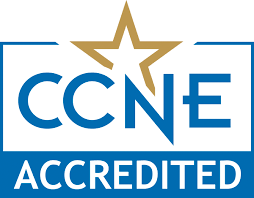 The Doctor of Nursing Practice, Master of Science in Nursing, and Post-Graduate Nursing Certificate (FNP specialization) programs at the University of St. Augustine for Health Sciences are accredited by the Commission on Collegiate Nursing Education (CCNE), 655 K Street, NW, Suite 750, Washington, DC 20001, 202-887-6791.
The Doctor of Nursing Practice, Master of Science in Nursing, and Post-Graduate Nursing Certificate (FNP specialization) programs at the University of St. Augustine for Health Sciences are accredited by the Commission on Collegiate Nursing Education (CCNE), 655 K Street, NW, Suite 750, Washington, DC 20001, 202-887-6791.
How Our MSN Program Stands Apart

We offer multiple role specialties.
Expand your responsibilities in the clinic and beyond. The MSN curriculum features five role specialties: Family Nurse Practitioner, Psychiatric Mental Health Nurse Practitioner–Primary Care, Adult Gerontology Nurse Practitioner, Nurse Educator, and Nurse Executive.

We offer acceleration options.
The MSN program offers an accelerated pathway for those who wish to earn their degree faster. You can stack up to three courses per term, take self-paced courses that award credit according to competency assessments, receive academic credit for your professional experience, and ask to transfer credits from another graduate program. While USAHS does not offer Title IV for any term in which an accelerated learning course is taken without a full term "Anchor" course, other financing alternatives may be available. Please refer to the Financial Aid webpage for additional information.

We're flexible.
Flexibility is key to the USAHS experience. Alongside its accelerated pathway, the MSN program also offers a less intensive pathway to degree completion. Your faculty and advisors can help you choose a study plan that fits your busy life. Our nursing programs feature six start dates each year, including midterm starts.
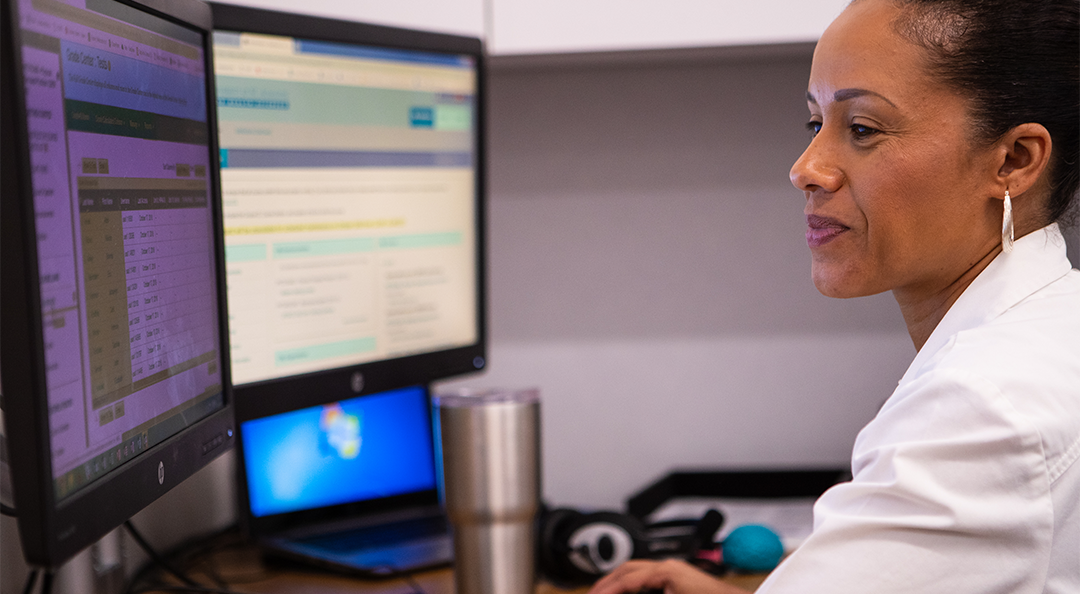
We're online + hands-on.
Our online coursework has asynchronous elements, plus optional synchronous sessions held during convenient times. We also offer optional on-campus immersions, a chance to enjoy face-to-face connections with faculty and fellow students. Students in the nurse practitioner specialty tracks must complete one clinical intensive in our state-of-the-art Centers for Innovative Clinical Practice.

We offer a range of clinical practicum placements.
You will complete practicum hours by working onsite with a preceptor who meets accreditation and state licensure requirements. (Practicum placements are determined by USAHS based on the student's academic needs and to provide the best educational experience. Students should plan on the need to travel and/or relocate for practica.)
MSN Requirements and Program Information
Nursing Role Specialties
Nursing Role Specialties
Your MSN studies are your time to specialize—and refine the focus of your career. Whether your future workplace will be a clinic, classroom, or boardroom, as an MSN student you'll choose from our three clinical and two non-clinical role specialties.
Clinical Specialties
Family Nurse Practitioner
Earn your family nurse practitioner (FNP) credential and increase your responsibilities, versatility, and positive impact on patients. As an FNP, you can serve as a primary care provider across a wide range of healthcare settings, from hospitals to private practice. You will work with people of all ages to diagnose and treat conditions, prescribe medication, order tests, and promote preventive care. Our FNP role specialty includes one required on-campus clinical intensive and 585 practicum hours to prepare you for the FNP certification exam.
Psychiatric Mental Health Nurse Practitioner–Primary Care
In our Psychiatric Mental Health Nurse Practitioner–Primary Care role specialty, you'll prepare to provide a full range of specialized services that constitute mental health and psychiatric care and treatment. You will learn to assess and diagnose patients, prescribe medications, and provide therapeutic interventions. You may also oversee case management, undertake policy development for programs, and engage in comprehensive advocacy education and research. The curriculum includes one required on-campus clinical intensive and 600 practicum hours.
Adult Gerontology Nurse Practitioner
Given the aging baby boomer population and national shortages of nurses and physicians, adult gerontology nurse practitioners (AGNPs) are needed now more than ever. In our AGNP role specialty, you will prepare to assess and diagnose patients and manage their care from young adulthood to old age. You will learn best practices for prescribing medication and other treatments related to complex chronic conditions, as well as strategies for preventing illness and promoting wellness throughout adulthood. You'll explore strategies for addressing the cultural, psychological, and social aspects of aging. Our AGNP curriculum includes one required on-campus clinical intensive and 600 practicum hours.
Non-Clinical Specialties
Nurse Educator
If you're passionate about conveying your nursing knowledge and experience to the next generation of nurses, consider a career in nursing education. In our Nurse Educator role specialty, you will learn strategies for curriculum design and delivery. You'll prepare for a range of teaching and training roles across academic, clinical, and public health settings. Our Nurse Educator role specialty includes optional on-campus or virtual immersions and 225 practicum hours. Certifications are available.
Nurse Executive
Nurse executives design, implement, and direct systems for patient care delivery. In our Nurse Executive role specialty, you'll learn strategies for managing and leading teams, influencing operational and clinical processes, and impacting patient outcomes at your organization. You'll prepare for a role as a manager, director, supervisor, chief nursing officer, and more. This specialty includes optional on-campus or virtual immersions and 225 practicum hours. A certification option is available.
Request Information
X Close
MSN Curriculum
Curriculum
Students in the online Master of Science in Nursing (MSN) program complete a total of 36 credit hours and 225 contact hours of practicum when they choose either the Nurse Educator, or Nurse Executive role specialty.
The Family Nurse Practitioner (FNP) role specialty consists of 50 credit hours and 585 contact hours of practicum.
MSN - Family Nurse Practitioner Role Specialty
| Family Nurse Practitioner (FNP) Role Specialty | Credit Hours |
|---|---|
| Trimester 1 | |
| IPE7001 Interprofessional Education and Collaborative Practice ▀ IPE 7001B Interprofessional Education and Collaborative Practice (B) | 3 |
| IPE7121 Organizational Leadership and Policy in Healthcare IPE 7121B Organizational Leadership and Policy in Health Care (B) | 3 |
| Trimester 2 | |
| NUR7610 Advanced Physiology and Pathophysiology | 3 |
| IPE7050 Evidence-Based Practice for Nurse Leaders▀ | 3 |
| Trimester 3 | |
| NUR7560 Advanced Pharmacology | 3 |
| NUR7161 Theoretical and Scientific Underpinning for Nursing Practice | 3 |
| Trimester 4 | |
| IPE7421 Interprofessional Approaches to Regional and Global Population Health IPE7421B Interprofessional Approaches to Regional and Global Population Health (B) | 3 |
| NUR7580 Advanced Health Assessment and Differential Diagnosis | 3 |
| Trimester 5 | |
| IPE7400 Healthcare Informatics and Technology Management | 3 |
| NUR 7570 Primary Healthcare of the Family I | 3 |
| Trimester 6 | |
| NUR7575 Primary Healthcare of the Family II | 3 |
| NUR 7571 FNP Role Practicum I (180 contact hours) ♦ | 4 |
| Trimester 7 | |
| NUR 7585 Primary Healthcare of Family III | 3 |
| NUR 7572 FNP Role Practicum II (180 contact hours) ♦ | 4 |
| Trimester 8 | |
| NUR 7573 FNP Role Practicum III (225 contact hours) ♦ | 5 |
| NUR7574 MSN Capstone *1 hour is required for the FNP role specialty. | 1–4* |
| Total Credit Hours for Family Nurse Practitioner Role Specialty | 50 |
MSN - Nurse Educator Role Specialty
| Nurse Educator Role Specialty | Credit Hours |
|---|---|
| Trimester 1 | |
| IPE 7001 Interprofessional Education and Collaborative Practice ▀ | 3 |
| IPE7121 Organizational Leadership and Policy in Health Care ▀ | 3 |
| Trimester 2 | |
| IPE7050 Evidence-Based Practice for Nurse Leaders ▀ | 3 |
| IPE7421 Interprofessional Approaches to Regional and Global Population Health ▀ | 3 |
| Trimester 3 | |
| NUR7161 Theoretical and Scientific Underpinning for Nursing Practice | 3 |
| IPE7400 Healthcare Informatics and Technology Management | 3 |
| Trimester 4 | |
| NUR7100 Pathophysiology, Health Assessment, Pharmacology for Nurse Educators | 3 |
| EDF 7175 Foundational Theories in Education | 3 |
| Trimester 5 | |
| EDF 7161 Program and Curricular Design for Health Science Education | 3 |
| NUR 7400 MSN Role Practicum I (135 contact hours) ♦ | 3 |
| Trimester 6 | |
| EDF 7050 Teaching Methods in Higher Education | 3 |
| NUR 7450 Role Practicum II (2 practicum hours [90 contact hours] and 1 didactic hour for capstone) ♦ | 3 |
| Total Credit Hours for Nurse Educator Role Specialty | 36 |
MSN - Nurse Executive Role Specialty
| Nurse Executive Role Specialty | Credit Hours |
|---|---|
| Trimester 1 | |
| IPE 7001 Interprofessional Education and Collaborative Practice ▀ | 3 |
| IPE7121 Organizational Leadership and Policy in Health Care ▀ | 3 |
| Trimester 2 | |
| IPE7050 Evidence-Based Practice for Healthcare Professionals ▀ | 3 |
| IPE7421 Interprofessional Approaches to Regional and Global Population Health ▀ | 3 |
| Trimester 3 | |
| NUR7161 Theoretical and Scientific Underpinning for Nursing Practice | 3 |
| IPE 7400 Healthcare Informatics and Technology Management | 3 |
| Trimester 4 | |
| HSA 7200 B Foundations of Healthcare Administration B | 3 |
| HSA 7250 Human Resources Management & Organizational Development in Healthcare | 3 |
| Trimester 5 | |
| IPE 7133 Strategic Planning in Healthcare Administration | 3 |
| NUR 7400 Role Practicum I (135 contact hours) ♦ | 3 |
| Trimester 6 | |
| HSA 7236 Accounting, Finance, and Economics for the Healthcare Leader | 3 |
| NUR 7450 Role Practicum II ) (2 practicum hours [90 contact hours] and 1 didactic hour for capstone) ♦ | 3 |
| Total Credit Hours for Nurse Executive Role Specialty | 36 |
MSN - Psychiatric Mental Health Nurse Practitioner – Primary Care Role Specialty
| Psychiatric Mental Health Nurse Practitioner–Primary Care Role Specialty | Credit Hours |
|---|---|
| Trimester 1 | |
| IPE 7001 Interprofessional Education and Collaborative Practice or IPE 7001B Interprofessional Education and Collaborative Practice (B) ▀ | 3 |
| IPE 7121 Organizational Leadership and Policy in Health Care or IPE 7121B Organizational Leadership and Policy in Health Care (B) ▀ | 3 |
| Trimester 2 | |
| NUR 7050 Evidence-Based Practice for Nurse Leaders ▀ | 3 |
| NUR 7610 Advanced Physiology and Pathophysiology | 3 |
| Trimester 3 | |
| NUR 7161 Theoretical and Scientific Underpinning for Nursing Practice | 3 |
| NUR 7580 Advanced Pharmacology Advanced Health Assessment and Differential Diagnosis | 3 |
| Trimester 4 | |
| NUR 7560 Advanced Pharmacology | 3 |
| NUR 7310 Advanced Neurobiology and Psychopathophysiology | 3 |
| Trimester 5 | |
| NUR 7315 Advanced Psychopharmacology | 3 |
| NUR 7330 Psychotherapy for Psychiatric Mental Health Nurse Practitioner Practice | 3 |
| Trimester 6 | |
| NUR 7350 PMHNP: Acute and Chronic Management of Child/Adolescent with Psychiatric Mental Health Conditions | 4 |
| NUR 7541 PMHNP Role Practicum I (180 contact hours) Child & Adolescent Populations (200 contact hours) ♦ | 4 |
| Trimester 7 | |
| NUR 7375 PMHNP: Acute and Chronic Management of the Adult and Older Adult with Psychiatric Mental Health Conditions | 4 |
| NUR 7542 PMHNP Role Practicum II Adult and Older Adult Populations (200 contact hours) ♦ | 4 |
| Trimester 8 | |
| NUR 7543 PMHNP Role Practicum III Diverse/Special Populations (200 contact hours) ♦ | 4 |
| NUR 7577 PMHNP MSN community engagement capstone project | 5 |
| Total credit hours for the PMHNP-PC role specialty | 55 |
MSN - Adult Gerontology Nurse Practitioner Role Specialty
| Adult Gerontology Nurse Practitioner Role Specialty | Credit Hours |
|---|---|
| Trimester 1 | |
| IPE 7001 Interprofessional Education and Collaborative Practice or IPE 7001B Interprofessional Education and Collaborative Practice (B) ▀ | 3 |
| IPE 7121 Organizational Leadership and Policy in Health Care or IPE 7121B Organizational Leadership and Policy in Health Care (B) ▀ | 3 |
| Trimester 2 | |
| NUR 7050 Evidence-Based Practice for Nurse Leaders ▀ | 3 |
| NUR 7610 Advanced Physiology and Pathophysiology | 3 |
| Trimester 3 | |
| NUR 7161 Theoretical and Scientific Underpinning for Nursing Practice | 3 |
| NUR 7560 Advanced Pharmacology | 3 |
| Trimester 4 | |
| IPE 7421 Interprofessional Approaches to Regional and Global Population Health or IPE 7421B Interprofessional Approaches to Regional and Global Population Health (B) ▀ | 3 |
| NUR 7580 Advanced Health Assessment and Differential Diagnosis | 3 |
| Trimester 5 | |
| IPE 7400 Healthcare Informatics and Technology Management | 3 |
| NUR 7210 Adult Gerontology Primary Healthcare Part I | 4 |
| Trimester 6 | |
| NUR 7235 Adult Gerontology Primary Healthcare Part II | 4 |
| NUR 7551 AGNP Role Practicum I (200 contact hours) ♦ REQUIRED INTENSIVE | 4 |
| Trimester 7 | |
| NUR 7250 Adult Gerontology Primary Healthcare Part III | 3 |
| NUR 7552 AGNP Role Practicum II (200 contact hours) ♦ | 4 |
| Trimester 8 | |
| NUR 7553 AGNP Role Practicum III (200 contact hours) ♦ | 5 |
| NUR 7574 MSN Capstone *4 credit hours are required for the AGNP role specialty. | 1–4* |
| Degree Credit Hours 55 | 55 |
♦ Course requires practicum hours.
▀ Course offers optional immersion.
Request Information
X Close
MSN Admission Requirements
Admissions Requirements
To be considered for admission, a candidate must submit:
- Application for Admission form
- A bachelor's degree in nursing (BSN) with a cumulative GPA of 2.8 on a 4.0 scale
- Official transcripts from each college or university previously attended. An official transcript is one sent directly to the Student Services office by the Registrar of the issuing institution or one forwarded in a sealed envelope from the issuing institution.
- Evidence of an unrestricted/unencumbered registered nurse (RN) license in the state of residence
- Professional resume or curriculum vita; an equivalent of one full-time year of experience as a registered nurse by the time you start your first practicum course
- Essay of approximately 500 words describing your short- and long-term career goals and how you plan to achieve them
- Comprehensive background check requiring fingerprints and drug screen is required during the admissions process. These screenings are completed at the applicant's expense.
- Two professional references from a nurse educator, preceptor, or immediate supervisor; peers or personal relationships are not acceptable.
- An interview if requested
If you completed your education in a foreign country, please submit an original copy of a degree credentialing evaluation from an agency recognized by the National Association of Credential Evaluation Services (NACES). The evaluation must indicate previous education at the minimum level of a baccalaureate degree earned at an accredited college or university in the United States.

International Students Applying for Admission
Foreign-trained candidates who do not require a student visa to participate in University courses and/or degrees can be considered for admission. All instruction in the MSN program is conducted in English. To be considered, a candidate must submit:
Transcripts (original and a translated version, if applicable) and a credentialing evaluation from an agency recognized by the National Association of Credential Evaluation Services (NACES) that provide evidence of training at a level equivalent to that of a bachelor's degree in the United States.
Official TOEFL (Test of English as a Foreign Language) score report if their education was completed in a language other than English or they reside in a non-English speaking country. A minimum score of 550 (paper-based testing), 210 (computer-based testing) or 83 (IBT – Internet based testing) is required.
Request Information
X Close
How to Apply
Applying to our Master of Science in Nursing (MSN) program is easy, straightforward—and free!
Contact Your EA at Any Time in the Process
Brittany Pickwoad
Carolyn Perryman
Before You Apply
- Review admissions requirements for the MSN.
- Request transcripts from all the higher education institutions you've attended. We will calculate your cumulative GPA. Ask each institution to email the transcript to [email protected] (note the underscore). If they offer only paper copies, ask them to mail the transcript to:
Office of Admissions
The University of St. Augustine for Health Sciences
1 University Blvd
St Augustine, FL 32086
- We will need to verify your nursing license. You can use the Nursys database's free service to obtain a copy to upload.
- Update your professional resume. Be sure to describe the duties you performed in each position.
- Write your entrance essay. See these guidelines.
- Line up two professional references who are nurse educators or nurse supervisors. We do not accept peer or physician references.
Fill Out Your Application
- Begin the free online application on our website. Select your program, campus ("distance"), and start date, and create your account.
- Follow directions to upload your nursing license, resume, and essay.
- In the "Admissions Documents" section, input the names, job titles, and contact information for your references.
- Click "Submit for Review" and contact your enrollment advisor (EA) so they can review your application and move it forward to Admissions.
Special Considerations
Foreign applicants: If you earned your BSN degree outside the United States, contact your enrollment advisor for further instructions on how to start your NACES.
NursingCAS users: If you have started your application through NursingCAS, contact your enrollment advisor for further instructions.
Contact Your EA
Have questions or need help? Contact MSN advisor Ana Marshall at 760-410-5389 or [email protected].
For More Information
Sign up for a virtual information session to meet faculty and learn more about the MSN program.
X Close
MSN Tuition & Cost of Attendance
MSN Tuition & Fees
Total program tuition and fees for the 2021-2022 academic year are as follows.
| Educator and Executive Role Specialties | Tuition and Fees |
|---|---|
| School Expenses | |
| Tuition | $25,750.00 |
| Program Fees | $2,004.00 |
| Books & Associated School Expenses | $1,000.00 |
| Total Program Direct Expenses | $28,754.00 |
Students whose address on record is in California at the time tuition is first charged and/or who attend the California campus will be responsible for paying a one-time Student Tuition Recovery Fund non-refundable fee, pursuant to California Code of Regulations §76120.
For a breakdown of tuition, fees and estimated living expenses click here.
FNP Tuition & Fees
Total program tuition and fees for the 2021-2022 academic year are as follows.
| Family Nurse Practitioner Role Specialty | Tuition and Fees |
|---|---|
| School Expenses | |
| Tuition Approximately - 50 credit hour program | $39,552.00 |
| Program Fees | $2,672.00 |
| Books & Associated School Expenses | $2,550.00 |
| Total Program Direct Expenses | $44,774.00 |
Students whose address on record is in California at the time tuition is first charged and/or who attend the California campus will be responsible for paying a one-time Student Tuition Recovery Fund non-refundable fee, pursuant to California Code of Regulations §76120.
For a breakdown of tuition, fees, and estimated living expenses, click here.
PMHNP-PC Tuition & Fees
Total program tuition and fees for the 2021-2022 academic year are as follows.
| Psychiatric Mental Health Nurse Practitioner–Primary Care Role Specialty | Tuition and Fees |
|---|---|
| School Expenses | |
| Tuition Approximately - 55 credit hour program | $40,326.00 |
| Program Fees | $2,672.00 |
| Books & Associated School Expenses | $2,550.00 |
| Total Program Direct Expenses | $45,548.00 |
Students whose address on record is in California at the time tuition is first charged and/or who attend the California campus will be responsible for paying a one-time Student Tuition Recovery Fund non-refundable fee, pursuant to California Code of Regulations §76120.
For a breakdown of tuition, fees, and estimated living expenses, click here.
AGNP Tuition & Fees
Total program tuition and fees for the 2021-2022 academic year are as follows.
| Adult Gerontology Nurse Practitioner Role Specialty | Tuition and Fees |
|---|---|
| School Expenses | |
| Tuition Approximately - 55 credit hour program | $40,326.00 |
| Program Fees | $2,672.00 |
| Books & Associated School Expenses | $2,550.00 |
| Total Program Direct Expenses | $45,548.00 |
Students whose address on record is in California at the time tuition is first charged and/or who attend the California campus will be responsible for paying a one-time Student Tuition Recovery Fund non-refundable fee, pursuant to California Code of Regulations §76120.
For a breakdown of tuition, fees and estimated living expenses click here.
Financial Aid
Several financial aid resources are available to help you fund your MSN studies. However, please note, at this time, Title IV financial aid is not available to students enrolled in the MSN-PMHNP-PC or MSN-AGNP role specialties; however, USAHS has applied for eligibility. Our financial aid counselors are available to explain your options.
Our financial aid counselors can be reached by email, phone, or on campus. Regular office hours are 8 a.m. to 5 p.m., Monday through Friday in each time zone. If you are unable to meet during regular office hours, after-hours appointments are available by request.
Please visit our Financial Aid Contact page for more information.
*All costs are approximate and subject to change.
Request Information
X Close
MSN Accreditation and State Approvals
Master of Science in Nursing (MSN) Nurse Executive Role Specialty
Accreditation & Disclosure on Licensure
The University of St. Augustine for Health Sciences is currently accepting applications for enrollment in the Master of Science in Nursing (MSN) Nurse Executive role specialty for residents in the following states: Alabama, Alaska, Arizona, Arkansas, California, Colorado, Connecticut, Delaware, Florida, Georgia, Hawaii, Iowa, Idaho, Illinois, Indiana, Kansas, Kentucky, Louisiana, Maine, Maryland, Michigan, Minnesota, Mississippi, Missouri, Montana, Nebraska, New Mexico, Nevada, New Hampshire, New Jersey, Ohio, Oklahoma, Oregon, Pennsylvania, South Carolina, South Dakota, Tennessee, Texas, Utah, Vermont, Virginia, Washington, Washington DC, West Virginia, Wisconsin, and Wyoming.
The map below identifies the states from which the University is now accepting applications for the MSN program (indicated in blue).
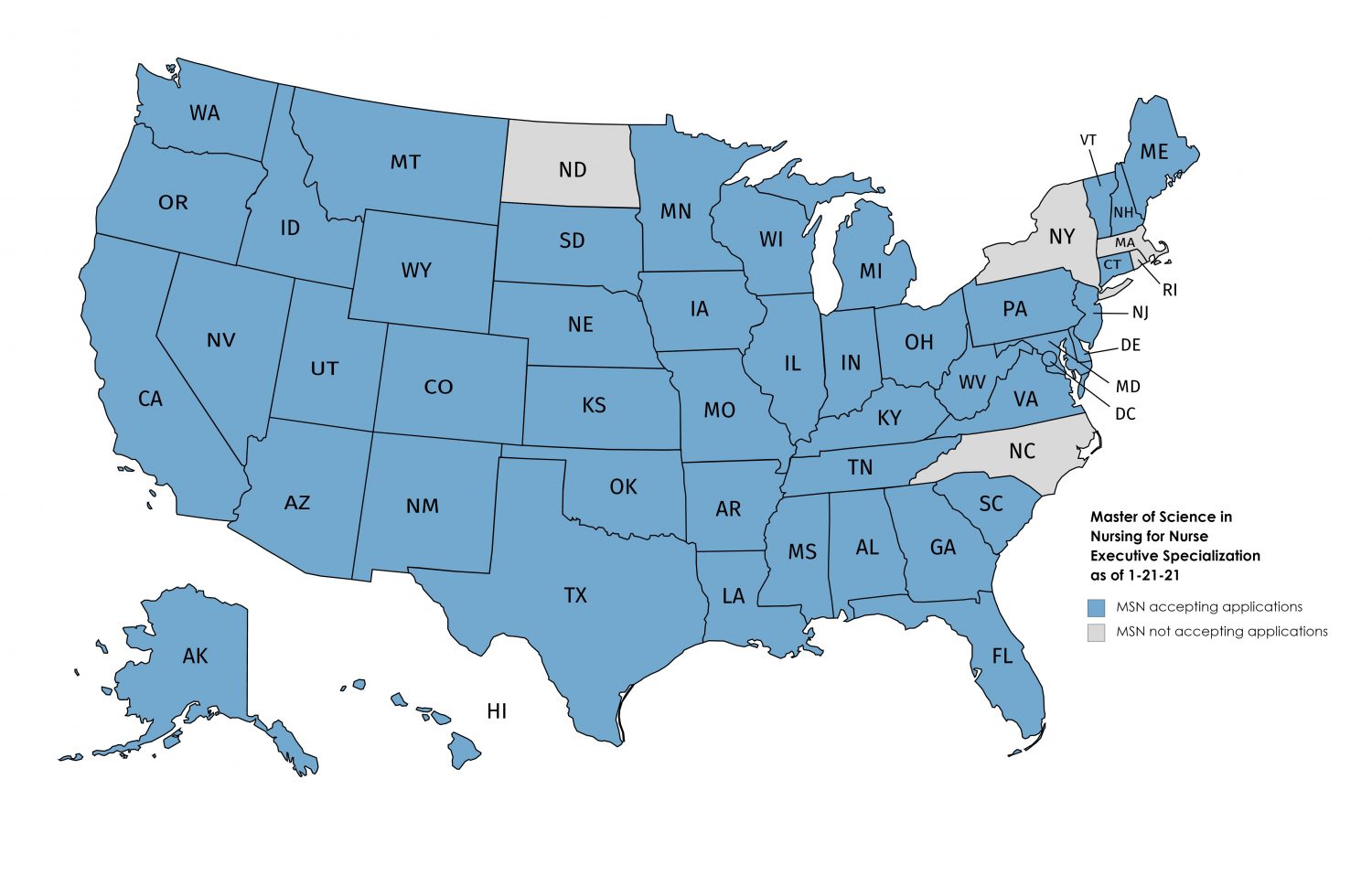
Master of Science in Nursing (MSN) Nurse Educator Role Specialty
Accreditation & Disclosure on Licensure
The University of St. Augustine for Health Sciences is currently accepting applications for enrollment in the Master of Science in Nursing (MSN) Nurse Educator role specialty for residents in the following states: Alabama, Alaska, Arizona, Arkansas, California, Colorado, Connecticut, Delaware, Florida, Georgia, Hawaii, Iowa, Idaho, Illinois, Indiana, Kansas, Kentucky, Louisiana, Maine, Maryland, Michigan, Minnesota, Mississippi, Missouri, Montana, Nebraska, New Mexico, Nevada, New Hampshire, New Jersey, Ohio, Oklahoma, Oregon, Pennsylvania, South Carolina, South Dakota, Texas, Utah, Vermont, Virginia, Washington, Washington DC, West Virginia, Wisconsin, and Wyoming.
The map below identifies the states from which the University is now accepting applications for the MSN program (indicated in blue).
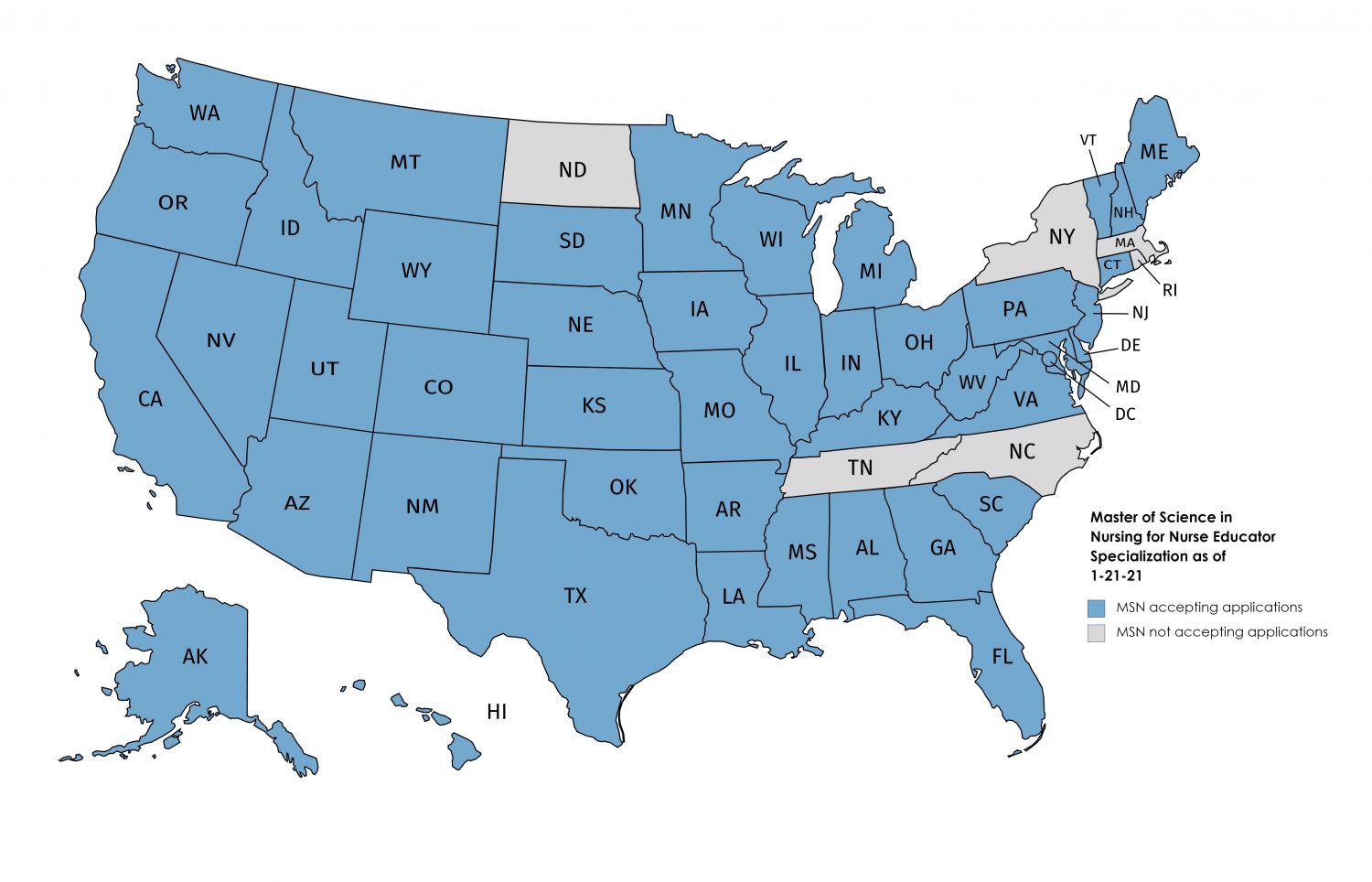
Higher Education State Approvals
The University of St. Augustine for Health Sciences holds licensure/authorization to operate a physical campus in three states — California, Florida and Texas. Please refer to the Licensure page for more detailed information. The University has additional state approvals and exemptions to provide distance education. Please visit the State Licensure page for more detailed information.
CCNE Accreditation
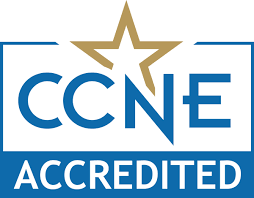
The Master of Science in Nursing (MSN) program at the University of St. Augustine for Health Sciences is accredited by the Commission on Collegiate Nursing Education, 655 K Street NW, Suite 750, Washington, DC 20001, 202-887-6791.
Non-Licensure Role Specialties
The University of St. Augustine for Health Sciences' Master of Science in Nursing (MSN) role specialties in Nurse Educator and Nurse Executive are designed to build on the skills of BSN-prepared licensed nurses by focusing on interprofessional approaches to patient care through role specialties in leadership, and education. Because these are post-licensure role specialties, they do not prepare graduates for initial or advanced licensure. It is the prospective student's responsibility to understand, evaluate, and comply with all requirements relating to nursing practice in the state in which he or she intends to practice and/or resides as requirements vary widely. USAHS makes no representations or guarantee that completion of coursework or programs will permit an individual to obtain state licensure, authorization, endorsement, or other state credential. For more information about the requirements to practice, students should contact the appropriate Board of Nursing or state agency.
Master of Science in Nursing (MSN) Family Nurse Practitioner (FNP) Role Specialty
Accreditation & Disclosure on Licensure
USAHS is currently accepting applications for enrollment in the Master of Science in Nursing program with Family Nurse Practitioner (MSN-FNP) role specialty for residents in the following states: Alabama, Alaska, Arizona, Arkansas, California, Colorado, Connecticut, Delaware, Florida, Georgia, Hawaii, Illinois, Indiana, Idaho, Iowa, Kansas, Kentucky, Maine, Maryland, Michigan, Minnesota, Mississippi, Missouri, Montana, Nebraska, New Hampshire, New Jersey, New Mexico, Nevada, Oklahoma, Ohio, Oregon, Pennsylvania, South Carolina, South Dakota, Tennessee, Texas, Utah, Vermont, Virginia, Washington, West Virginia, Wisconsin, and Wyoming. USAHS has not made a determination that its curriculum meets the educational requirements for licensure or certification in the following locations: American Samoa, the Commonwealth of Puerto Rico, Guam, the Virgin Islands, the Commonwealth of the Northern Mariana Islands, the Republic of the Marshall Islands, the Federated States of Micronesia, and the Republic of Palau.
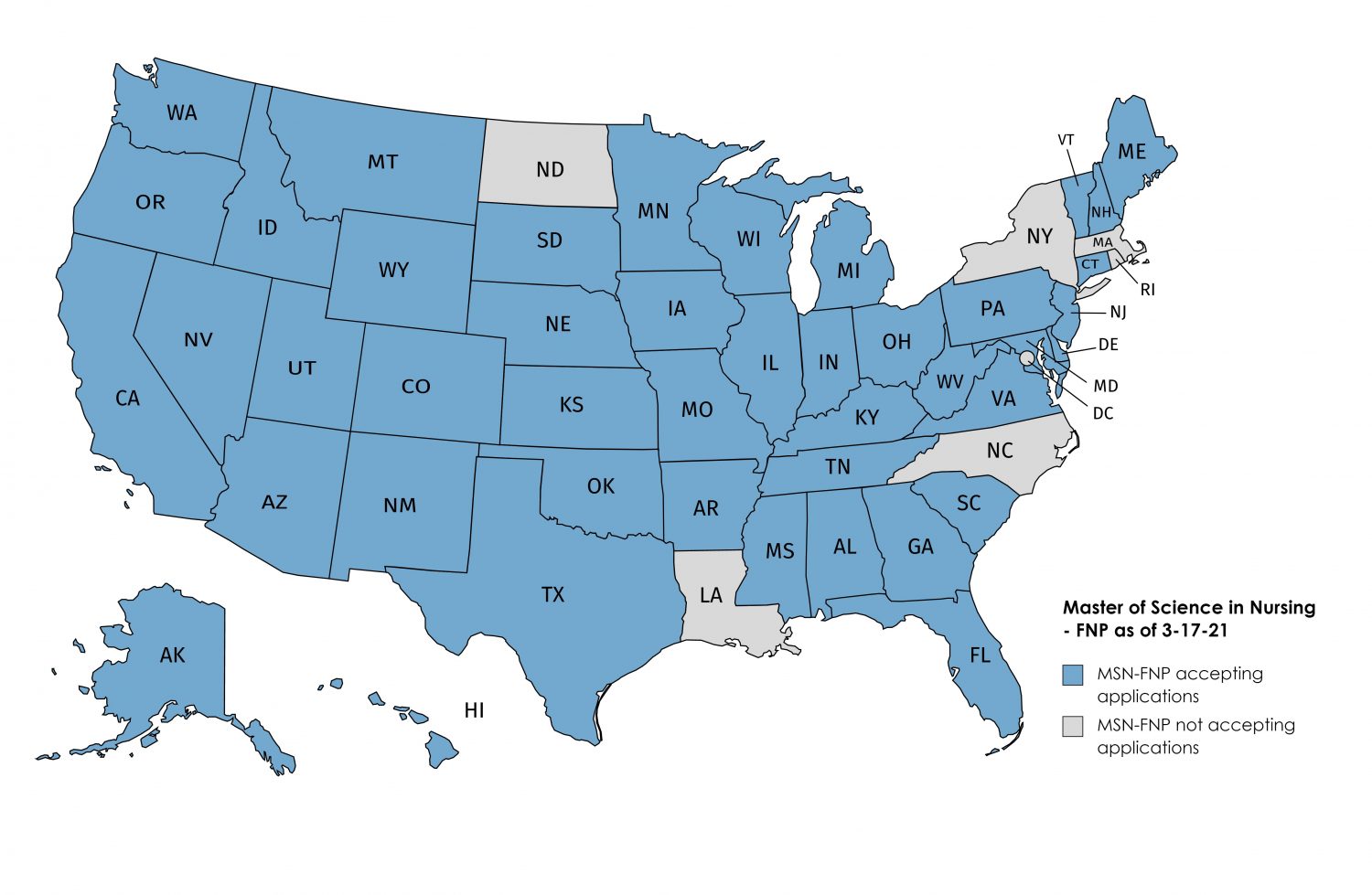
USAHS is currently not accepting applications from states where the program does not meet state licensure requirements and/or where the institution does not have state authorization. However, prospective students are encouraged to check back in the near future as the program may be offered in additional states. For states denoted in blue, USAHS has determined the program prepares students for professional licensure in those states. USAHS has not made a determination regarding whether the MSN-FNP program satisfies the requirements for professional licensure in the states denoted in gray. For more information, students should contact the appropriate state licensure board to ensure an understanding of state licensure requirements as regulations vary from state to state.
Master of Science in Nursing (MSN) – Psychiatric Mental Health Nurse Practitioner–Primary Care Role Specialty
Accreditation & Disclosure on Licensure
USAHS is currently accepting applications for enrollment in the Master of Science in Nursing program with Psychiatric Mental Health Nurse Practitioner–Primary Care (MSN-PMHNP-PC) role specialty for residents in the following states: Alaska, Colorado, Connecticut, Florida, Illinois, Indiana, Maine, Michigan, Mississippi, Montana, New Jersey, Oklahoma, and South Carolina. USAHS has not made a determination that its curriculum meets the educational requirements for licensure or certification in the following locations: American Samoa, the Commonwealth of Puerto Rico, Guam, the Virgin Islands, the Commonwealth of the Northern Mariana Islands, the Republic of the Marshall Islands, the Federated States of Micronesia, and the Republic of Palau.
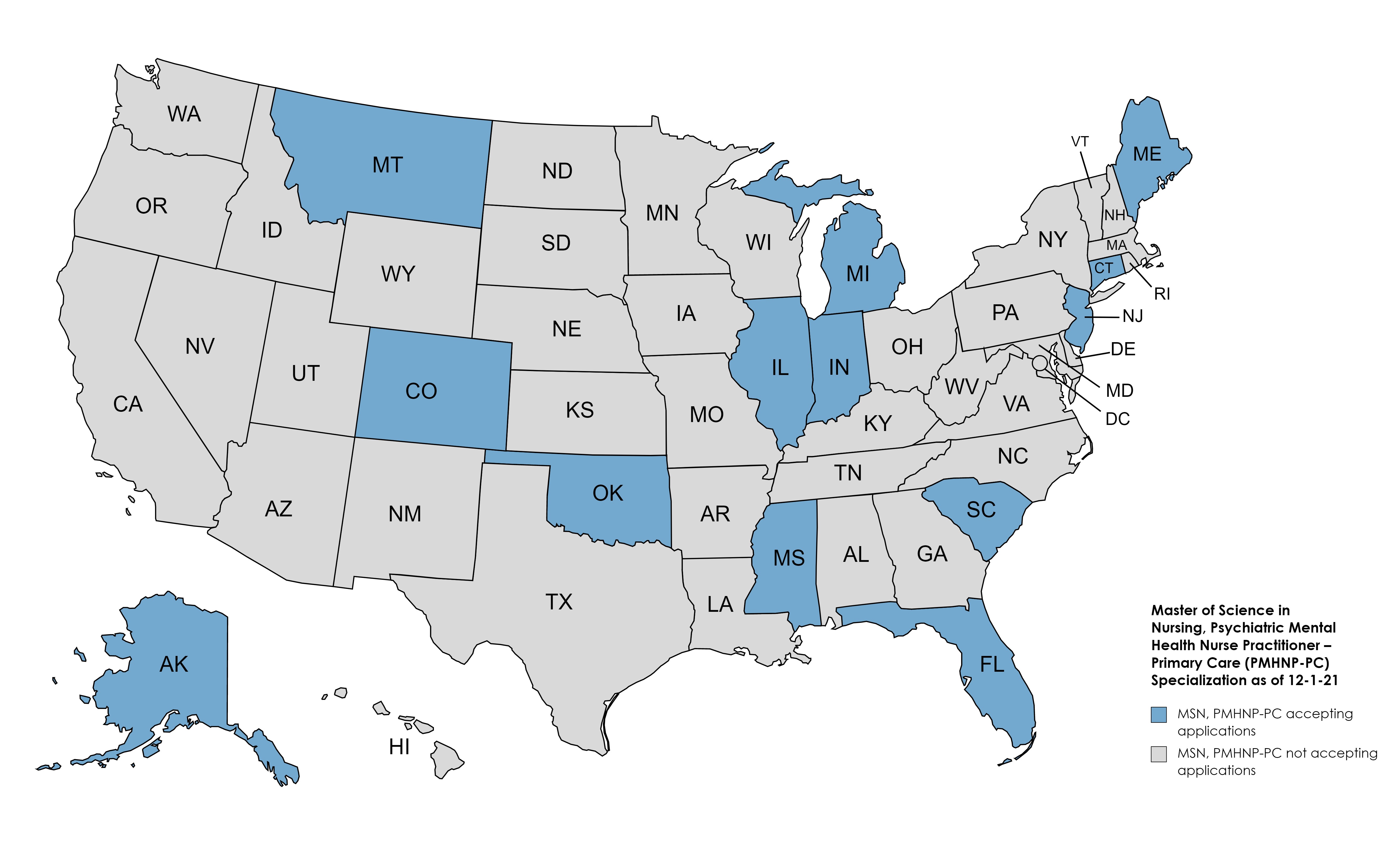
USAHS is currently not accepting applications from states where the program does not meet state licensure requirements and/or where the institution does not have state authorization. However, prospective students are encouraged to check back in the near future, as the program may be offered in additional states. For states denoted in blue, USAHS has determined the program prepares students for professional licensure in those states. USAHS has not made a determination regarding whether the MSN-PMHNP-PC program satisfies the requirements for professional licensure in the states denoted in gray. For more information, students should contact the appropriate state licensure board to ensure an understanding of state licensure requirements as regulations vary from state to state.
Master of Science in Nursing (MSN) – Adult Gerontology Nurse Practitioner Role Specialty
Accreditation & Disclosure on Licensure
USAHS is currently accepting applications for enrollment in the Master of Science in Nursing program with Adult Gerontology Nurse Practitioner (MSN-AGNP) role specialty for residents in the following states: Alaska, Colorado, Connecticut, Florida, Illinois, Indiana, Maine, Michigan, Mississippi, Montana, New Jersey, Oklahoma, and South Carolina. USAHS has not made a determination that its curriculum meets the educational requirements for licensure or certification in the following locations: American Samoa, the Commonwealth of Puerto Rico, Guam, the Virgin Islands, the Commonwealth of the Northern Mariana Islands, the Republic of the Marshall Islands, the Federated States of Micronesia, and the Republic of Palau.
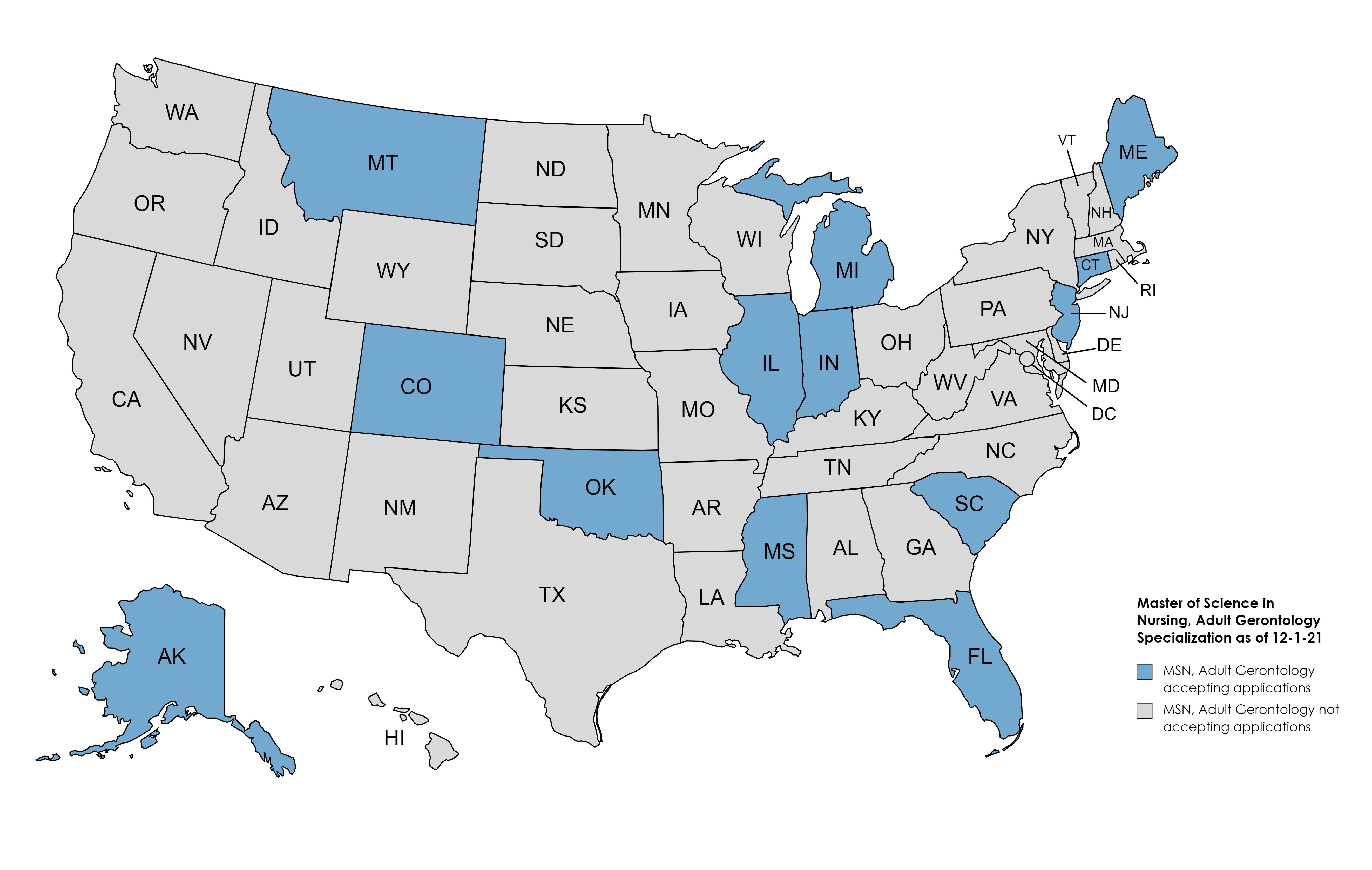
USAHS is currently not accepting applications from states where the program does not meet state licensure requirements and/or where the institution does not have state authorization. However, prospective students are encouraged to check back in the near future, as the program may be offered in additional states. For states denoted in blue, USAHS has determined the program prepares students for professional licensure in those states. USAHS has not made a determination regarding whether the MSN-AGNP program satisfies the requirements for professional licensure in the states denoted in gray. For more information, students should contact the appropriate state licensure board to ensure an understanding of state licensure requirements as regulations vary from state to state.
CCNE Accreditation

The Master of Science in Nursing (MSN) program at the University of St. Augustine for Health Sciences is accredited by the Commission on Collegiate Nursing Education, 655 K Street NW, Suite 750, Washington, DC 20001, 202-887-6791.
Note on Certification Exams
Nurse Practitioner graduates must hold a master's, postgraduate, or doctoral degree from a nurse practitioner program accredited by the CCNE or ACEN to be eligible to take the necessary role specialty national examination to be certified as a nurse practitioner, which most states require in order to be licensed to practice as an NP. Graduates should take the exam that aligns with their role specialty: FNP-BC or FNP; PMHNP-BC or PMH-BC; or AGPCNP-BC or A-GNP. The Master of Science in Nursing (MSN) program at the University of St. Augustine for Health Sciences is accredited by the Commission on Collegiate Nursing Education, 655 K Street NW, Suite 750, Washington, DC 20001, 202-887-6791.
Note on Licensure, Authorization, Endorsement, or Other State Credential Necessary to Practice as a Nurse Practitioner
Most states require that graduates pass a nurse practitioner national certification exam in order to apply for licensure or other credential to practice as a nurse practitioner in a state. Graduates must hold a master's, postgraduate, or doctoral degree from a nurse practitioner program accredited by the CCNE or ACEN in order to be eligible for an NP national certification exam; national certification as an NP is required for licensure to practice as an NP in most states. Graduates should take the exam that aligns with their role specialty (FNP-BC or FNP; PMHNP-BC or PMH-BC; or AGPCNP-BC or A-GNP). The Master of Science in Nursing (MSN) program at the University of St. Augustine for Health Sciences is accredited by the Commission on Collegiate Nursing Education, 655 K Street NW, Suite 750, Washington, DC 20001, 202-887-6791. While the MSN-FNP, MSN-PMHNP-PC, and MSN-AGNP programs are designed to lead to licensure, authorization, endorsement, or other state credential necessary to practice as a nurse practitioner, it is the prospective student's responsibility to understand, evaluate, and comply with all requirements relating to nursing practice in the state in which he or she intends to practice and/or resides, as requirements vary widely. Prospective students are advised that relocation to another state may impact their ability to complete field experiences and/or to obtain professional licensure, certification, or other credential in another state. Prospective students are advised to carefully review, evaluate, and understand the requirements of the applicable licensure board in the state in which they intend to relocate. USAHS makes no representations or guarantee that completion of coursework or programs will permit an individual to obtain state licensure, authorization, endorsement, or other state credential, including prescriptive authority, where requirements may vary between different states. For more information about the requirements to practice, students should contact the appropriate Board of Nursing or state agency.
"Notice to State of Washington Students": is approved by the Washington State Nursing Care Quality Assurance Commission to conduct practice experiences in the state of Washington for MSN/Nurse Educator, MSN/Nurse Executive, and MSN/FNP program tracks. Learn more.
View our state licensure page.
Request Information
X Close
The USAHS School of Nursing is proud to host Alpha Alpha Alpha—our very own chapter of the Honor Society of Nursing, Sigma Theta Tau International (Sigma).
Read More
MSN Learning Outcomes
Upon completion of the Master of Science in Nursing (MSN) program, graduates will be able to:
- Employ the skills necessary to engage in lifelong learning through intellectual inquiry to maintain continuing competence and professional growth.
- Communicate and collaborate with other healthcare providers in the promotion of wellness and the management of acute and chronic disorders for optimization of patient outcomes.
- Apply leadership skills to improve outcomes for individuals, diverse populations, and organizations.
- Apply systems thinking and synthesize scientific data with concepts and models from nursing and other sciences to promote health, prevent illness, and maintain quality of life for individuals and populations.
- Practice critical thinking and evidence-based decision-making to ensure the delivery of nursing care that is of optimal quality and safety.
- Effectively and ethically use technology in the direct or indirect delivery and coordination of nursing care and collection of data for improvement of quality and safety.
- Deliver or direct nursing practice using advanced knowledge, professional skills, and decision-making based on theory and best scientific evidence.
- Exhibit professionalism and adherence to ethical standards of nursing practice; advocate for patients and promote policy development to ensure quality healthcare that is safe, equitable, and cost-effective.
Cua.edu Family Nurse Practitioner Track Admission Requirements
Source: https://www.usa.edu/college-health-sciences/school-of-nursing/master-science-nursing-msn/
0 Response to "Cua.edu Family Nurse Practitioner Track Admission Requirements"
Publicar un comentario